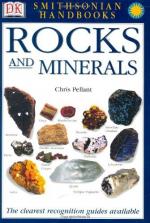|
This section contains 1,112 words (approx. 4 pages at 300 words per page) |

|
Minerals are inorganic substances that occur in nature. Many minerals are relevant to human nutrition, including water, sodium, potassium, chloride, calcium, phosphate, sulfate, magnesium, iron, copper, zinc, manganese, iodine, selenium, and molybdenum. Cobalt is a required mineral for human health, but it is supplied by vitamin B12. Cobalt appears to have no other function, aside from being part of this vitamin. There is some evidence that chromium, boron, and other inorganic elements play some part in human nutrition, but the evidence is indirect and not yet convincing. Fluoride seems not to be required for human life, but its presence in the diet contributes to long-term dental health. Some of the minerals do not occur as single atoms, but occur as molecules, which are composed of one or more atoms. These include water, phosphate, sulfate, and selenite (a form of selenium). Sulfate contains an atom of sulfur, and the...
|
This section contains 1,112 words (approx. 4 pages at 300 words per page) |

|


